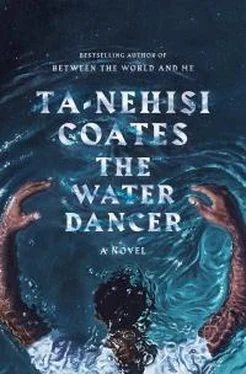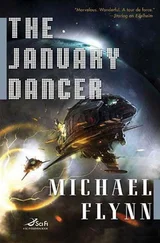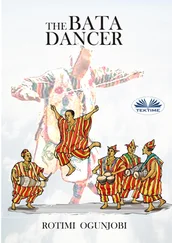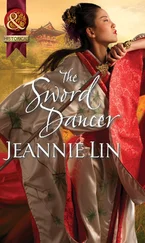The woman was one of the Caulleys—Alice Caulley—a family, many years ago, split in two. Half had gone off to Kentucky while half remained. I remember her because the Caulleys who left took along those who tasked for them and among that number was Pete’s sister, Maddie. I never met her. But he spoke of her often, and whenever news of her filtered up from Kentucky through the grapevine of tasking folks who moved between the Caulley branches—news that she was alive and whole, united with the remnants of family that traveled with her—his face would light up and remain as such for the rest of the week.
“Give us a song!” Alice snapped, and when no one answered, she walked over to Cassius, one of the men in waiting, and slapped him. Now she yelled again, “Sing, damn you!”
It always happened like this—that is what I had been told. Bored whites were barbarian whites. While they played at aristocrats, we were their well-appointed and stoic attendants. But when they tired of dignity, the bottom fell out. New games were anointed and we were but pieces on the board. It was terrifying. There was no limit to what they might do at this end of the tether, nor what my father would allow them to do.
The slap roused him. My father stood up and looked around nervously.
“Come now, Alice. We have something better than any Negro song,” he said, and turned to me, and though he did not say another word I knew what he wanted.
I scanned the room and caught sight of a deck of oversized cards stacked on one of the small coffee tables. I recognized the cards as the kind Maynard used in his reading lessons. On one side the cards were all the same—a map of the known world. On the other side they each featured an acrobat contorted into the shape of a different letter, with a short rhyme underneath. I had overheard Maynard reading from these cards with his tutor. I had with sideways glances, and a few minutes of study here and there, memorized them, for no other reason than the fact of enjoying the silly rhymes on each side. Now I retrieved the cards from the table and turned toward Alice Caulley.
“Mrs. Caulley, would you shuffle, ma’am?”
She leaned over unsteadily, took the cards from me, and shuffled them in her hands. And then I asked if she would be so kind as to let me inspect them. Having done this, I handed them back to her and asked that she place them each on the table, face-down in any order. I watched her hands until the small coffee table was covered with maps in miniature.
“And what now, boy?” she asked warily.
I asked that she pick up a card and show it to anyone she pleased, except me. When she’d done this, she turned back to me with raised eyebrows. I said, “With the rest he’ll agree, and assist them with a letter ‘E.’ ”
Now her eyebrows retreated some toward their natural position as skepticism turned to pique. “Again,” she said, and then picked another card, showed it to more people now. I said, “Here he is, twisted and twined, to make an ‘S’ if you do not mind.”
And then the pique turned to a slight smile. I felt the tension in the room slack a bit. She picked another, showed it, and I said, “He’s forced to train hard, less the letter ‘C’ be marred.”
Now Alice Caulley laughed, and when I looked over, I saw my father smiling thin and small, and though the others who tasked like me that evening were still standing at attention, I felt the fear flowing out of their stoic faces. Alice Caulley kept reaching for the cards, flipping faster now. But I matched her speed. “Here’s a letter ‘V’ to view. You’ll find its shape just like new.”…“With his hands in the air, a letter ‘H’ he does declare.”
By the time the deck was done, they were all laughing and now applauding. The man in the corner was no longer snoring but looked up, trying to understand the sudden commotion. When the applause died down, Alice Caulley, her smile carrying the edge of menace, looked to me and said, “And what else, boy?”
I stared at her for a moment, longer than any tasking man should, and nodded. I was only twelve, but I was fully confident of what came next, a trick I had long practiced down in the Street. Having the guests in my confidence, I requested that they line up against the drawing room wall. I went first to Edward Mackley, who wore his blond curls pinned back like a woman, asking him to tell me the first moment he knew he loved his wife. And then I asked Armatine Caulley, Alice’s cousin, her favorite place in all the world, and then I went to Morris Beacham, and asked him to tell me about the first time he’d hunted pheasant. I went down the line like this until I held a clutch of stories in my head, so many that no one else could remember who had said what and what the particular details were. Only Mr. Fields, Maynard’s gruff tutor, declined. But when I went back down the line, repeating back to each of the speakers their own stories, in every detail, but with drama and embellishment, I saw the tutor pull up to the edge of his seat, and his eyes were aglow like all the others’, aglow like those of my tasking elders, down on the distant Street, used to be.
Now even the waitstaff had to break their solemn gaze and smile. Indeed, among the whole party, only Mr. Fields was able to preserve his customary gruff aspect, save the glow in his narrowed eyes. It was late now. My father bid each of his guests to quarters throughout the old house and we were dispatched to make sure each of them was comfortable. When all the guests were settled, we retreated into the Warrens exhausted, knowing that our duties would begin again in mere hours, for all the guests would expect their breakfast prepared and waiting when they arose.
The Monday morning following that party, I was helping Thena prepare the wash when I was called away by Roscoe and sent to see my father off in the side parlor. I first went to my room, washed, put on a set of house clothes, then wound my way up the back stairs until I emerged in the central corridor, and then, walking down that corridor, found my father standing, as if he’d been waiting on me. Behind him, I saw Maynard seated at a desk writing and a gentleman standing over him. The gentleman was Mr. Fields, who tutored Maynard three times a week. He wore a look of pained frustration, and Maynard’s own face was stricken.
My father smiled at me, but this does not convey the look he gave, because my father had a variety of smiles—smiles of displeasure, or disinterest, or shock and amazement—indeed he smiled so much it made him hard to read, but I knew the smile I saw that morning because it was the same smile I’d seen, mere months ago, down near the Street, down in the fields where he’d flicked me the copper coin.
“Good morning, Hiram,” he said. “How are you?”
“Fine, sir,” I said.
“Good. Good,” he said. “Hiram, I want you to spend some moments with Mr. Fields. Would you do that for me?”
“Yes, sir,” I said.
“Thank you, Hiram,” he said.
And with that, my father looked at Maynard, still smiling, and said, “Come on, son.”
I saw an immediate look of relief extend over Maynard’s face as he left his work. He didn’t look my way as he and my father left the room. We were, Maynard and I, at a distance at that time in our lives. We spoke only in banalities, with no acknowledgment of what we were to each other.
Mr. Fields spoke with an accent, one I had never heard before, and I immediately imagined it might hail from the Natchez my elders spoke so much of.
“The other day,” he said, “that was some trick.” I nodded silently, still not sure of his intentions. There were penalties for the Tasked who’d learned to read, and it now occurred to me that my “trick” might bring some sort of wrath. But my trick didn’t hinge on reading, because I could not read. I had simply filed away what I had heard of Maynard’s own fumblings and matched them with the cards left scattered on the table. But Mr. Fields knew nothing of that technique, and I was not quite sure how, or whether, I should explain.
Читать дальше












